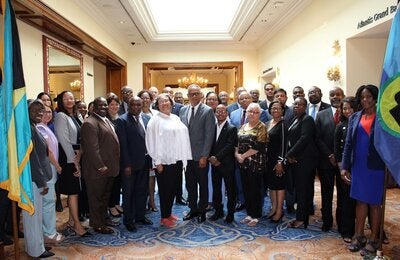Anguilla is an autonomous overseas territory of the United Kingdom and is one of the northernmost of the Leeward Islands in the Lesser Antilles group in the Caribbean. It covers an area of 91 km2 and includes some uninhabited islets and keys. It is divided administratively into 14 districts. The entire population is considered urban.
In 2000 the total population of Anguilla was 11 047 inhabitants; by 2023 this figure had risen to 15 899, representing a 43.9% increase. Regarding the country’s demographic profile, in 2023 people over 65 years of age accounted for 11.2% of the total population, an increase of 3.9 percentage points compared to the year 2000. In 2023, there were 104.7 women per 100 men and 66.2 older people (65 years or older) per 100 children under 15 years of age, as can be seen in the country’s population pyramids, distributed by age group and sex (Figure 1). Considering the population between 15 and 64 years of age to be potentially active (i.e., potential participants in the labor force), this group represented 71.9% of the total population of the country in 2023 (11 439 people). When we add these figures to the potentially passive population (2 685 under 15 years of age and 1 776 over 65 years of age), the result is a dependency ratio of 39.0 potentially passive people per 100 potentially active people. This ratio was 55.3 in 2000.
Life expectancy at birth in 2023 was 77.6 years, higher than the average for the Region of the Americas and 1.6 years higher that in 2000.
(Source: Health in the Americas+)






